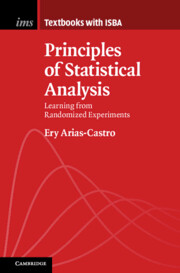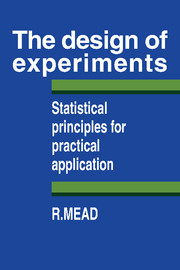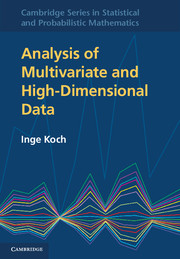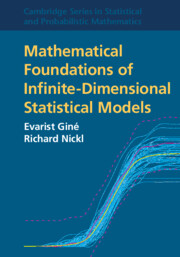Principles of Statistical Analysis
This compact course is written for the mathematically literate reader who wants to learn to analyze data in a principled fashion. The language of mathematics enables clear exposition that can go quite deep, quite quickly, and naturally supports an axiomatic and inductive approach to data analysis. Starting with a good grounding in probability, the reader moves to statistical inference via topics of great practical importance – simulation and sampling, as well as experimental design and data collection – that are typically displaced from introductory accounts. The core of the book then covers both standard methods and such advanced topics as multiple testing, meta-analysis, and causal inference.
- Includes 700 exercises and has an online companion R notebook to encourage real engagement
- Focuses on essentials for modern applications, giving a text that is both self-contained and concise
- Strikes the right balance – rigorous but not technical – to make the mathematics inviting
Reviews & endorsements
'With the rapid development of data-driven decision making, statistical methods have become indispensable in countless domains of science, engineering, and management science, to name a few. Ery Arias-Castro's excellent text gives a self-contained and remarkably broad exposition of the current diversity of concepts and methods developed to tackle the challenges of data science. Simply put, everyone serious about understanding the theory behind data science should be exposed to the topics covered in this book.' Philippe Rigollet, Department of Mathematics, Massachusetts Institute of Technology
'A course on statistical modeling and inference has been a staple of many first-year graduate engineering programs. While there are many excellent textbooks on this subject, much of the material is inspired by models of physical systems, and as such these books deal extensively with parametric inference. The emerging data revolution, on the other hand, requires an engineering student to develop an understanding of statistical inference rooted in problems inspired by data-driven applications, and this book fills that need. Arias-Castro weaves together diverse concepts such as data collection, sampling, and inference in a unified manner. He lucidly presents the mathematical foundations of statistical data analysis, and covers advanced topics on data analysis. With over 700 problems and computer exercises, this book will serve the needs of beginner and advanced engineering students alike.' Venkatesh Saligrama, Data Science Faculty Fellow, Department of Electrical and Computer Engineering, Department of Computer Science (by courtesy), Boston University
'In this book, aimed at senior undergraduates or beginning graduate students with a reasonable mathematical background, the author proposes a self-contained and yet concise introduction to statistical analysis. By putting a strong emphasis on the randomization principle, he provides a coherent and elegant perspective on modern statistical practice. Some of the later chapters also form a good basis for a reading group. I will be recommending this excellent book to my collaborators.' Nicolas Verzelen, Mathematics, Computer Science, Physics, and Systems Department, University of Montpellier
'This text is highly recommended for undergraduate students wanting to grasp the key ideas of modern data analysis. Arias-Castro achieves something that is rare in the art of teaching statistical science - he uses mathematical language in an intelligible and highly helpful way, without surrendering key intuitions of statistics to formalism and proof. In this way, the reader can get through an impressive amount of material without, however, ever getting into muddy waters.' Richard Nickl, Statistical Laboratory, Cambridge University
Product details
August 2022Paperback
9781108747448
400 pages
228 × 152 × 21 mm
0.53kg
Available
Table of Contents
- Preface
- Acknowledgments
- Part I. Elements of Probability Theory:
- 1. Axioms of probability theory
- 2. Discrete probability spaces
- 3. Distributions on the real line
- 4. Discrete distributions
- 5. Continuous distributions
- 6. Multivariate distributions
- 7. Expectation and concentration
- 8. Convergence of random variables
- 9. Stochastic processes
- Part II. Practical Considerations:
- 10. Sampling and simulation
- 11. Data collection
- Part III. Elements of Statistical Inference:
- 12. Models, estimators, and tests
- 13. Properties of estimators and tests
- 14. One proportion
- 15. Multiple proportions
- 16. One numerical sample
- 17. Multiple numerical samples
- 18. Multiple paired numerical samples
- 19. Correlation analysis
- 20. Multiple testing
- 21. Regression analysis
- 22. Foundational issues
- References
- Index.





